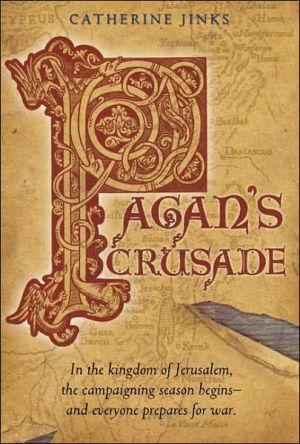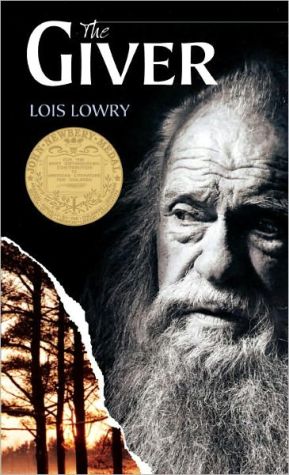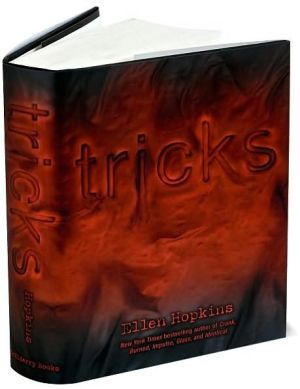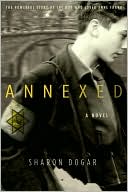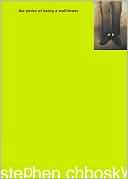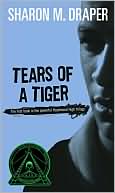Pagan's Crusade (Pagan Chronicles Series #1)
An amusing novel telling the story of 16-year-old Pagan, who finds himself working for Lord Roland, a Knight Templar in 12th-century Jerusalem. An action-packed, fast-moving story enlivened by the narrator's wry reflections and warm wit.\ \ In twelth-century Jerusalem, orphaned sixteen-year-old Pagan is assigned to work for Lord Roland, a Templar knight, as Saladin's armies close in on the Holy City.\
Search in google:
Catherine Jinks spins a colorful tale loaded with action, down-and-dirty details of medieval life, and a healthy helping of sarcasm sure to appeal to teen readers - especially boys.Down on his luck and kicked in the pants one too many times, sixteen-year-old Pagan Kidrouk arrives on the doorstep of the Templar Knights in medieval Jerusalem, looking for work as a squire. He’s expecting only some protection from the seedier aspects of life on the street and a few square meals. Instead, Pagan finds himself hard at work for Lord Roland de Bram - an exciting life of polishing Lord Roland’s armor, laundering his garments, and even training to fight by his side. But as the Infidel Saladin leads his army to Jerusalem, it becomes more and more difficult for Pagan and Lord Roland to discern what action to take or whom to trust. Neither Saladin’s army nor the Christian Crusaders offer easy answers. Is a bloody battle for control of the Holy City inevitable?Publishers WeeklyIn a starred review, PW wrote, "Jinks's alternately hilarious, often poignant novel turns medieval history into fodder for both high comedy and allegory." Ages 12-up. (Sept.) Copyright 2004 Reed Business Information.
CHAPTER ONE\ A big man in brown, sitting behind a table. Big hands. Big chest. Short and broad. Head like a rock, face scarred like a battle axe. He looks up and sees–what’s this? A street urchin? Whatever it is, it’s trouble. Trouble advances cautiously.\ "They said I should report to the Standard-Bearer."\ The big man nods.\ "You can call me sir," he says. (Voice like gravel rattling in a cast-iron pot.) He pulls out a quill pen. "Name?" he says.\ "Pagan."\ "Pagan what?"\ "Pagan Kidrouk."\ "Pagan Kidrouk, sir."\ (Hell in a handcart.)\ "Pagan Kidrouk, sir."\ Scratch, scratch. He writes very slowly.\ "Age?"\ "Sixteen. Sir."\ "Born in?"\ "Bethlehem."\ Rockhead looks up. The brain peeps out from behind the brawn.\ "Don’t worry, sir. It didn’t happen in a stable."\ Clunk. Another jest falls flat on the ground.\ "Rule number one, Kidrouk. In the Order of the Temple you speak only when you’re spoken to."\ "Yes, sir."\ "Understand?"\ "Yes, sir."\ Rockhead smells rich and rare, like a well-matured piece of cheese. No baths for the Templars. Hot water is for girls and porridge and other soft, wet things. If a Templar wants a bath he can go and stand in the rain. That’s what God put it there for.\ "And where did you come from, Kidrouk?" (The unspoken question: out of a slop bucket?) Rockhead is highly suspicious. You can see what he’s thinking. Just look at this runt! Smells like the Infidel, and looks like a Bedouin boy. Skin the color of braised almonds. Built like a horsewhip. Black hair. Black eyes. What in the name of God is this Order coming to? We’ll be recruiting stray dogs next.\ "I’m a local, sir. I served in the Jerusalem garrison."\ "On?"\ "The night watch. I patrolled the northern beat. Between the Postern of Lazarus and the Postern of Saint Magdalene."\ "You mean the Jewry quarter?"\ "That’s the one. Sir."\ "And why did you leave?"\ "Well, sir . . . it was the jokes."\ Pause. Rockhead’s brows roll together like gathering thunderclouds. But the storm doesn’t break.\ "It was the what?"\ "It was the jokes, sir. In the guardroom. Not that I object to jokes as such. Some of my best friends are complete jokes. But I don’t like leper jokes. Or dysentery jokes. Especially when I’m eating."\ Rockhead puts his pen down. Game’s over.\ PAGAN'S CRUSADE by Catherine Jinks. Copyright (c) 2003 by Catherine Jinks. Published by Candlewick Press, Inc., Cambridge, MA.
\ Publishers WeeklyIn a starred review, PW wrote, "Jinks's alternately hilarious, often poignant novel turns medieval history into fodder for both high comedy and allegory." Ages 12-up. (Sept.) Copyright 2004 Reed Business Information.\ \ \ \ \ Children's LiteraturePagan Kidrouk, a sassy orphan escapee from a monastery headed by a kid-hating monk, faces the military regimentation of the Knights Templar and discovers adventure, friendship, and honor. Although he only wanted to escape his life on the streets, Pagan is soon totally involved in his role as squire, protecting and serving the angelic Sir Roland, "noblest of souls." In his bright street urchin voice, Pagan records the idiosyncrasies of Knight Templar service (all work and no play, but the chance to learn to fight with a sword) and describes a cast of thousands ranging from the effete "Lily," the French Patriarch, to Rockhead, the sergeant with "a face like the map of the Battle of Antioch." The story races along through the battle of Jerusalem and Pagan's winning bid for the freedom of his Master as a courtesy from the victorious Saladin; then suddenly falls flat in the last chapter. Readers who were on the edge of their seats for the story of Pagan's Crusade will probably pick up book number two in the series, but not from a passionate desire to find out what happens to the refugees from Jerusalem. 2003, Candlewick Press, Ages 9 to 13. \ — Elisabeth Greenberg\ \ \ KLIATTTo quote from the review of the hardcover in KLIATT, January 2004: Street urchin Pagan Kidrouk, age 16, desperate for money and a way off the streets, seeks work as a squire with the Templar Knights in Jerusalem. The year is 1187, and the Knights are charged with defending the kingdom from the Infidels and protecting pilgrims visiting the Holy Land. Pagan is assigned to work for the noble Lord Roland de Bram, to care for his horses ("the joyful duty of steaming manure," as Pagan sardonically puts it) and his armor, and if necessary to fight by his side. Meanwhile, Saladin's armies are marching toward the Holy City, and it takes all of Pagan's cleverness to save Roland and himself and make an escape. Jinks, a medieval scholar and author of books for YAs, originally published this lively series in her native Australia. Quick-witted Pagan, who narrates in the present tense, is a wonderful character, full of wisecracks and sarcastic asides but brave and loyal in defense of his beloved Lord Roland. Action, drama, and humor abound, along with colorful details of life in medieval times. Pagan's adventures make an interesting contrast to Michael Cadnum's more somber novels about squires in the era of the Crusades, The Book of the Lion and The Leopard Sword. (Book One of the Pagan Chronicles). KLIATT Codes: JS—Recommended for junior and senior high school students. 1992, Candlewick, 246p., Ages 12 to 18. \ —Paula Rohrlick\ \ \ \ \ School Library JournalGr 7 Up-An uneven attempt at blending history, adventure, and humor. Pagan, a streetwise teenager in muddy, medieval Jerusalem, tries to escape his criminal past by joining the Templar Knights. He becomes a squire to Lord Roland de Bram, a rigid, proper Knight, and together they uncover a plot to invade the Holy City. Rich with historical details, yet lacking in explanation of period or setting, the book fails to give readers the broader context of the events. Also, the ungainly first-person narration, much of it written in decapitated sentence fragments and parenthetical asides, will leave teens with the difficult tasks of empathizing with the narrator and attempting to understand the action. The character development is weak, leaving most of the players as mere caricatures. Pagan learns a lesson or two about responsibility while working with Roland and defending the city, but he doesn't really evolve beyond anachronistic, sarcastic remarks. His favorite phrase, "Christ in a cream cheese sauce," is funny once or twice, but loses something on the 20th reading. Readers who have moved beyond Jon Scieszka's "Time Warp Trio" series (Viking) may find something in the historical spoofing and sarcasm, but Leon Garfield's Smith (Farrar, 2000) is a better take on the clever, back-alley kid who gets in over his head. First in a proposed series.-Douglas P. Davey, Guelph Public Library, Ontario, Canada Copyright 2003 Reed Business Information.\ \ \ \ \ Kirkus ReviewsFirst of a quartet originally published in Australia, this orphan's-eye view not only brings the overripe streets of 12th-century Jerusalem to eye-watering life, but introduces a character as lovable, stubbornly loyal, and smart-mouthed as any Disney film sidekick. On the lam after an ill-considered wager, young Pagan Kidrouk signs up as a squire with the Knights Templar, an organization charged with both defending the Holy Land from the infidel, and pilgrims from brigands. Assigned to Lord Roland Roucy de Bram, a devout, deeply principled knight he quickly dubs "Saint George," Pagan soon finds himself escorting hilariously modern-sounding tourists on a day trip to the Jordan River, while casting aspersions on his colleagues-"The charm of a dead cow. The wit of a swamp." Meanwhile, tensions mount as Saladin's armies approach. Ever-noble, Lord Roland prepares for death; this mulish stance forces Pagan (who beneath his trash-talking exterior has grown to love and respect his master) into a desperate but successful ploy that puts them on the road to Tyre and, perhaps, France. Rich, vivid storytelling, with a sturdy base in historical events, and undercurrents both comic and serious. (maps) (Fiction. 12-15)\ \
